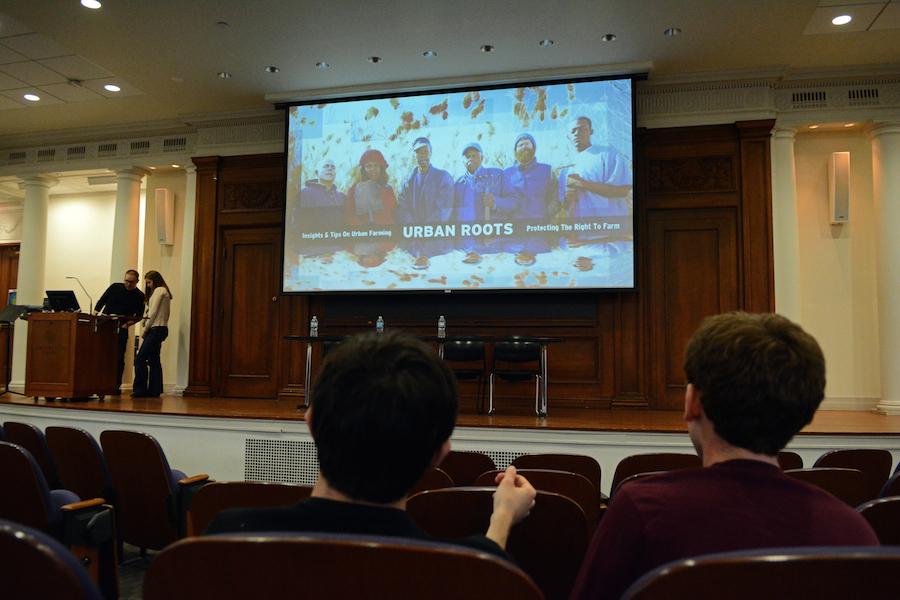Buffett Center sponsors ‘Urban Roots’ documentary screening, discussion
Nathan Richards/Daily Senior Staffer
Students wait as individuals organizing the event set up a screening of “Urban Roots.” The documentary focuses on self sustaining communities in Detroit that arose after the industrial decline.
April 29, 2014
Activists educated the Northwestern community Tuesday on urban agriculture and more sustainable lifestyles.
The Buffett Center, Students for Ecological and Environmental Development, Wild Roots and One Book One Northwestern co-sponsored the event held in Harris Hall that began with a screening of “Urban Roots,” a documentary that covers the attempts to use urban farming to create prosperity and sustainability after the industrial decline that occurred in Detroit. It was followed by a panel discussion featuring urban agriculture experts from Chicago and Detroit.
The Buffett Center, which facilitates multi-disciplinary research and promotes dialogue on international affairs for NU undergraduates, sponsored the event as a follow-up to the theme of 2013’s One Book One Northwestern, “The Last Hunger Season.”
“It follows the theme of some engaged learning opportunities we provided in the fall for students to get out and explore themes of the book like agricultural development, social enterprise and community organizing in a local context,” said Patrick Eccles, assistant director of global engagement at the center.
The documentary, produced by Tree Media Group in 2011, followed the efforts of several Detroit-based grassroots urban agriculture groups to create sustainable communities in the post-industrial city.
The film described Detroit citizens’ attempts to solve the food crisis. The population loss after the economic crash left many lots of land once used for housing empty, which led individuals to question what to do with the vacant land. In areas where people were once forced to buy low quality produce from nearby gas stations at high prices, they started farming in vacant lots, creating self-sustaining communities.
Following the screening, a panel discussion, led by Eccles, addressed local efforts to create sustainable life. The discussion featured panelists Lydia Wylie-Kellermann, a writer and activist in Detroit; Wendy Irwin, co-founder of The Yellow Tractor Project in Chicago and Evanston and Ethan Viets-Vanlear, an activist and student in Chicago.
“When I started learning about the food system and what I was eating for my whole life, it really fired me up,” said Viets-Vanlear, who works with LETS GO Chicago. “Gardening is one of the only kinds of hands-on work you can do where you can really see the change you make.”
Wylie-Kellermann, who lives in Detroit’s Jeanie Wylie Community, focused on urban agriculture, immigration and nonviolence. She said the effect of grassroots gardening has been instrumental in the recovery of Detroit’s communities.
“In a post-industrial society abandoned by corporations, seeing how Detroit has responded is pretty incredible,” Wylie-Kellermann said. “There isn’t a single neighborhood in Detroit that hasn’t been touched by urban agriculture.”
However, grassroots groups are facing challenges because Detroit city management is still not authorizing their efforts.
“We’re now under emergency management, which means we have no elected officials with any power in the city,” Wylie-Kellermann said, referencing the governor-appointed city manager who deals with zoning for vacant lots of land. “It’s a top-down control model that’s very different from the urban agriculture movement that is so strong.”
Irwin added urban farmers run into the same problems in Chicago.
“When it’s top-down and no one’s bothered to go out and learn about the community, that’s where we lose sustainability,” he said.
Irwin, who has worked with students from the Kellogg School of Management in building community gardens in Chicago and Evanston, said The Yellow Tractor Project hopes to continue working with NU students to “peacefully attack” the city with these urban gardens.
“The word ‘farm’ is scary to people, and a lot of people say they’ll never be a farmer,” Irwin said. “We’re making it our job to educate people and show them they can farm anywhere.”
Email: annemcdonough2017@u.northwestern.edu
Twitter: @anniemcd_news



